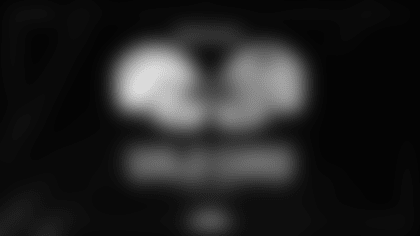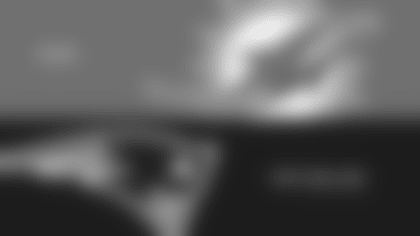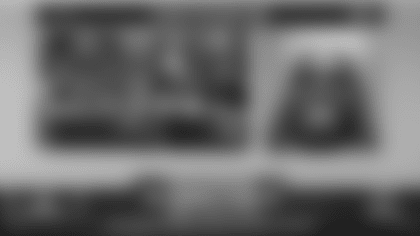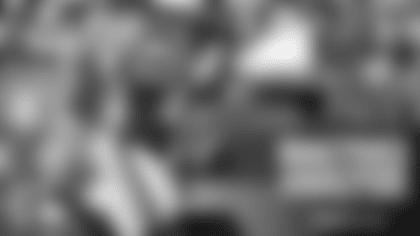BB: I don't think there's really too much to add from what we talked about yesterday. I made a lot of comments after the game [and] I think that all was pretty much verified in the film. Real competitive game, came down to a few of plays and fortunately we had a couple more in our favor yesterday. Good to win, but time to move on and big challenges ahead here with Dallas - a team we don't know, very talented team, fast team, explosive team. We have a lot of work to do on them. It's time to turn the page and head to Dallas.
Q: How much of it is still Wade Phillips and how much of it is now Jason Garrett when you look at what Dallas is doing?
BB: Offensively, I'd say it's all Jason. Defensively, it's a lot of Rob Ryan.
Q: This is back-to-back exposure to Ryan brothers' defenses.
BB: Yeah it is. There's definitely some carryover. I wouldn't say they're exactly the same but there's definitely some carryover.
Q: Is it a lot of the stuff we talked about last week with Rex Ryan's defense with the pre-snap looks and disguising or is it different?
BB: Yeah. Both [are] based out of the 3-4 but use a lot of different looks. Both defensives use a lot of multiple defensive backs: four, five, six, seven. There's a lot of carryover in some of those respects. I'm sure they talk a lot. I'm sure they exchange a lot of ideas and that kind of thing. There are individually some things that are the same, but the big thing is that this is a lot of different personnel - personnel that we're not very familiar with that's very good. They have a lot of good players on defense and offense.
Q: What is the biggest challenge DeMarcus Ware presents?
BB: Blocking him. They move him around - you don't know where he's going to be. It's hard to call a play and say, 'Well, he's going to be here; this is how we're going to deal him.' You can do that to some degree with some players. He'll play to percentages, but you're not ever sure exactly where he's going to be, depending on the call they have and what adjustments they make within that call to what you're doing. That's a big challenge. He's a heck of a football player. He's really fast, explosive, he's a good technique player [and] he plays with his hands well. Strong pass rusher - speed rush, power rush, up-and-under move, they use him on games, he comes up the middle, he comes outside. He's a tough matchup problem wherever he is on the field - real good player.
Q: There was a play yesterday where the offense picked up 13 yards when it looked like the Jets weren't set. Can you walk us through what Tom Brady may have seen there when BenJarvus Green-Ellis was uncovered?
BB: We saw that in the San Diego came, a couple of times with [Deion] Branch. A lot of times, defensively you get the call; you're trying to get matched up. Depending on what the call is, you might have to match to a certain receiver or go to the slot or whatever it is. Sometimes defensively you leave those receivers or those guys get uncovered - could be the outside guy, sometimes it's the inside guy. You get a guy out there and somebody doesn't adjust out. The quarterback should always do that when he comes out, looks over, sees the whole field and sees a guy uncovered. Or maybe a bad matchup, maybe there's a linebacker on a receiver or something - they just end up that way. Tom was able to take advantage of it.
Q: In a situation like that, does Tom Brady have the latitude to shelve everything? Is it just something he has to communicate between him and the receiver?
BB: Well, that's really all you have to do - the quarterback has to get it to whoever that guy is, however that is done.
Q: But he doesn't have to share that with the whole offensive line and everyone because he's just throwing it out there?
BB: Right. Really it doesn't make any difference what everyone else does. If that's the situation, they could stand on their head. Just get the ball to the guy that is uncovered. I first remember seeing that, [Dan] Fouts did that, he was very good at it. They had a lot of, obviously, good receivers, in addition to their receivers with [Chuck] Muncie and [Kellen] Winslow and the rest of that group. He would do that. He had a call and it was just snap the ball and give it to him. He was under center most of the time, so just get the snap and he would just zip it over to whoever. [If] the defense wasn't lined up or if they had a guy uncovered, he'd just call for the ball and get it and fire it to them. It's been around for awhile.
Q: You said before the season that it takes a month or so to know what kind of team you have -
BB: You guys are all going to be coming back on that one in the middle of October after we play five or six games.
Q: How much more do you know?
BB: We know a lot more. We've played five games; we've gone up against five good teams. They all had their individual game plans for us and we've matched up against their players and seen how our guys do against different schemes - man schemes, zone schemes, big receivers, small receivers, all the different matchups. I think we've learned a lot from all those different matchups and all the different things we've faced. We'll see some element of those this week in Dallas. Hopefully we'll be able to take those experiences and improve on them and build on them and make corrections. What are the things we did well and be able to utilize some of those again in similar matchup type situations - whether that be in the kicking game, punt return, punt protection. It's across the board - it's no one single thing. I think we've learned a lot. We've made a lot of adjustments over the first five games in some of the things that we're doing because we want to stay away from some things and move more to other areas. So that's been part of it. Different calls, different adjustments, even though it's the same play, just handle it a little bit differently in one way or another. Absolutely, it's something that continually goes on. Again, we didn't wait until now to say, 'Okay, well let's start looking at it.' We did it after the first game, after the second game and it's a continuous work in progress, but we've certainly seen things go and declare themselves one way or another. We've tried to adapt to it along the way. Not, like I said, wait five games to do something. It's clear how some teams are trying to attack us in different areas and how teams are trying to defend us.
Q: What did you like in that nickel look that you guys used with Mark Anderson next to Vince Wilfork and Albert Haynesworth?
BB: It's just our normal nickel. Guys have been practicing there all year. We rotate people through so it could end up with different guys in there. We played all those guys. We played all of our defensive linemen and they were all in there in different combinations together. There were times where we had it set a certain way but a big part of the time was whoever was in at the rotation at that time, then they were in there.
Q: Specific to Albert Haynesworth, the stat line doesn't say much. I think it was zero tackles and one quarterback hit. You've said that stats don't always reflect the performance, so when you went back and looked at the film, what did you see?
BB: [He] did some good things. There are other things that could have been better. He hadn't played in a couple weeks so hopefully this week he'll be able to get more time on the field and build on this week's performance. But I thought he did some things to help us.
Q: On third down, there were a couple of times, one Jeremy Kerley route and one Dustin Keller route, that they caught the ball short of the first down. Both times it appeared that James Ihedigbo was camped out there at the line. Do you think his positioning led to them cutting the routes short?
BB: Probably, yeah probably did. That's always a dilemma for the receivers. However you want to handle it in your passing game, that's kind of the dilemma. You can either tell the receiver to go up and get the first down and basically run into the defender and get covered and hope that he can find a little bit of space somewhere where the quarterback can throw it to him or you can tell him to shorten his route a little bit and get him the ball and hope that he can break the tackle or spin out of it or catch it and fall forward for the first down, that kind of thing. You just have to be on the same page on that, obviously. That's one of those things, it's tough offensively when I know I have to get to the first down and you're standing right there. If I run right to you, I just get covered. If I stop short, then I'm short of the first down. Whatever you're telling those guys, you do one or the other and pick the one you think is best. You say it all the time, 'Well, the guy doesn't get the yardage.' But if the guy is standing right there to get the yardage, do you really want to run right to him and be covered? What good does that do? You could do either one. Neither one is great - you just have to figure out how you want to coach it on that particular play. Maybe it's different from play to play, depending on what's going on around you. If I can go up and break off you and there's nobody over there, then great. But if I can't, if there's already a receiver in that area and I can't break one way or the other because there's some kind of spacing out there, then that kind of limits my options as to where I can go. But yeah, I think it probably did. That's why a receiver would do that, he doesn't want to be covered.
Q: This morning Tom Brady mentioned on the radio that there were some guys fighting through sickness and illness. Can you add any context as to how many guys and whether that was a big issue?
BB: I think everybody has something. We've played what, nine games now. A lot of practices, a lot of games, I'm sure a lot of guys are banged up. We have them, the Jets have them, everybody has them. That's just part of the game. I think we have a lot of tough guys on our team. We have guys that are out there practicing that are less than 100 percent. We have guys that are playing that are less than 100 percent. They're working hard and they're playing hard, so I have a lot of respect for that, both physically and mentally, the toughness that they showed in a tough game. There was a lot of good contact in that game yesterday. I'm sure every team has that, too. But I respect what our guys are doing and the way they did it yesterday, both through the week of practice and out there in the game.
Q: Maybe not just injuries, but he maybe referenced a sickness or an illness, is there anything like that?
BB: I'm sure there is. Ask him about it.
Q: Since Tom Brady called out the fans and asked them to be more vocal, have you noticed a difference in the loud levels in Gillette with the fans?
BB: They were definitely into the game yesterday, no question about it. I don't know, I don't really follow all of Brady's press conferences and I don't really follow them that carefully. Obviously it was an exciting game against the Jets. It's loud when we go down there; it's loud when they come up here. The fans were great. They gave us a lot of support. [I'm] glad we were able to give them some plays to encourage them to keep giving it to us.
Q: Do you think they could do more to disrupt the opposing quarterback?
BB: Honestly, I'm not that aware of it. I'm trying to focus on what we have to do, what our calls are, we're trying to coach the game. I'm not really trying to evaluate what the crowd is or isn't doing, honestly. When you're down on the field, to tell you the truth, it's like a constant roar. It goes up and it comes down a little bit but it's a constant roar. I think when you're in the stands, you hear it more. Obviously I haven't been in the stands [at Gillette, but] for the Bruins games and the Celtics games, you hear it coming to life. And I'm not saying there aren't different levels down on the field, but when you're down on the field, even just 65,000 people just all talking at the same time, there's a volume of noise there that's all directed at the field. It's always really kind of loud but it just gets louder. Honestly, I kind of realized that when I was young, when I was on the field for a couple of Army-Navy games. You know you have 100,000 people and obviously there's a lot of energy in that game. When you're in the stands, you kind of hear your fans cheering for your team. When things don't go well, you hear the other fans cheering for the other team. But when you're down on the field, it seems like there's always just a lot of noise. I'm not saying it isn't louder when you're on defense at home and offense on the road, because it is, but I'm just saying as a coach and all, there's a lot of noise all the time.
Q: Did you get a chance to drink out of the Stanley Cup?
BB: No, I didn't, but it was great to see the Bruins out there. They had an awesome season, obviously. It was a lot of fun to go to a couple of their games last spring. I know they've got it cranked up again already, but it was great for them to be there with us. A lot of guys came up and personally gave their support to myself and the team and vice versa. Great shout out to them and what they did last year and great wishes for the start of this season. It was good to have them there. It was good to have them there.
Q: Taylor Price was active and didn't play. Can you talk about what went into that decision? Also Mark Anderson, does his play lead to more playing time?
BB: All the players that were active could have played and some obviously played more than others. If they were there, we had plans to use them in certain situations and had confidence in using them. We'll be able to come in here every Monday and say, 'This guy played, this guy didn't, this guy did, this guy didn't.' You can always pick out a couple names to put in that category - that's the way it's always going to be. The players that played, great. The guys that didn't play as much, we have confidence in them if we had to play them. Any player who plays well is going to have the opportunity to earn more playing time. That's really what I tell the players from day one. From the day we bring them onto the team to the beginning of every season, your playing time is going to be primarily affected by how your performance is on the field. If your performance is good, then you'll get more playing time. If other players perform better than you, they'll get more opportunities than you. It's as simple as that. Can that change? Absolutely, it definitely can change. Sometimes there's opportunity as the result of injuries or things like that. But on a competitive basis, the players who play the best will play more than the ones who don't play as well. The ones who don't play as well, when they play better, then their opportunities will increase. I don't know how else to put it. Again, some things are game plans - there are some situational things and all that go into the game. That's not 100 percent concrete because some of it is situational and you play certain players based on the situation you're in. From a competitive standpoint, as far as who is ahead of who on the depth chart and who plays more, that's strictly based on performance and in some cases, availability. I'm sure Taylor will definitely be able to help us and contribute - he has. He had a good week of practice last week. [I] hope he'll build on that. He'll contribute for us.
Q: How long have you looked at as Stevan Ridley as a kick returner?
BB: Well we had Julian [Edelman] doing a lot of it. Ridley missed a little bit of time there in training camp so we started working him in a little bit more recently. With Julian not active yesterday, those duties shifted a little bit.
Q: You mentioned after the game yesterday that it was a good week of practice. In your experience, is a good week of practice a good barometer that you'll end up playing well or is it just something that makes you feel good heading into the game?
BB: That's a good question. The one thing you can never evaluate is how the other team practiced. You could have a bad week of practice but relative to what the other team did, it might be a good week of practice. Or you could have a good week of practice but relatively speaking you could be behind your opponent. There's really no way to know that. All I know is that we only have so many opportunities. We have opportunities to meet, we have opportunities to watch film, we have opportunities to walk through plays [and] we have opportunities to practice them. Those are limited; it's not an infinite number. We have a few on Wednesday, a few on Thursday, Friday review and a little Saturday walkthrough - that's what our opportunities are. I think that the more you get out of those, the better off you're going to be. The better your meetings, the better your film study, the better your walkthrough, the better your practice, the more prepared you are to go into the game and play it. That's what we try to emphasize. Some weeks that's better than others. I can only compare what we do to what we do. I can't compare it to what kind of week somebody else had in practice. They could have had an awesome week or they could have had a terrible week, who knows? I just know what we do. I try to get our team to perform as well in the opportunities that we have. Why waste them? That's what we're here for. It's in that context that I would say it. Some weeks are better than others for us. I thought last week was a good week for us. We've had other good weeks. It's not unprecedented, but it was a good week. I think that definitely helps our execution in the games and certainly our confidence going into the games. Not that we're not confident in winning, but on each individual play that you're asked to do, if you've done it in practice and you know that it's worked and you know exactly how to do it, then you can go out on the field and do it a lot more aggressively than if that isn't the case. I think there's certainly a lot of carryover and it's tied together. Again, you can have the greatest week of practice in the world and if you don't go out there and play well on Sunday, I don't want to say that's all that matters but it is all that matters. There's nothing in the standings for practice. It's how you perform under pressure. That's the ultimate test, but all the preparation that leads up to is certainly important.
Q: What disadvantages are you presented with when playing a team coming off its bye week, in terms of game planning and film study and things like that?
BB: Obviously they have more time and they have extra days to prepare for you. But I think we all have, in seven days from Sunday to Sunday, that's ample time to get ready. Every team has a bye week. With every short week is a long week and with every long week is a short week. It all evens out in the end. We've played on short weeks, we've played on long weeks, we've played [after] bye weeks, we've played against other teams [after their] bye weeks. I don't think there's anything you can do about any of that. You take the opportunities you have, like I just said, and you make the most of them. Here's what our opportunity is to get ready for the game, these are how many practice plays we have, this is our amount of meeting time, this our amount of team film study, this is how much time players have to do it on their own, how much will they do? You use all the time the most efficient way you can, in terms of getting treatment and weightlifting and being in condition and all the other things you do, the media, press conferences, all the other things. You just try to maximize your time and get the most of it and that's what we'll do this week. We can't really worry about whether Dallas played Monday night, played a week ago, played Sunday. It is what it is. All we can do is control what our situation is. We'll try to get the most out of it.












































